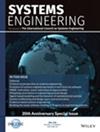工作在家政策对系统工程师和一般人群的影响
IF 1.6
3区 工程技术
Q4 ENGINEERING, INDUSTRIAL
引用次数: 0
摘要
2019冠状病毒病大流行带来了许多挑战,其中之一是2020年3月实施的“在家工作”政策。系统工程研究中心(SERC)和国际系统工程理事会(INCOSE)进行了两次在线调查——一次是在2020年大流行的头几个月,第二次是在一年后的2021年3月——以了解这些政策在系统工程界的影响。调查的格式包括多项选择题和开放式回答题,使用LDA进行主题建模分析。研究人员还从社交媒体上收集了同一时间段内的数据,将系统工程师的感受和经历与普通人群进行比较。本文章由计算机程序翻译,如有差异,请以英文原文为准。
Impacts of work‐at‐home policies on systems engineers and the general population
The COVID‐19 pandemic presented many challenges, one of them being the imposition of “work‐at‐home” policies in March 2020. The Systems Engineering Research Center (SERC) and the International Council on Systems Engineering (INCOSE) conducted two online surveys—one during the first months of the pandemic in 2020 and the second survey 1 year after, in March 2021—to understand the impact of these policies within the systems engineering community. The surveys' format consisted of multiple‐choice questions and open‐answer questions, which were analyzed using LDA for topic modeling. Data were also collected from social media during the same timeframes to compare the feelings and experiences of systems engineers with those of the general population.
求助全文
通过发布文献求助,成功后即可免费获取论文全文。
去求助
来源期刊

Systems Engineering
工程技术-工程:工业
CiteScore
5.10
自引率
20.00%
发文量
0
审稿时长
6 months
期刊介绍:
Systems Engineering is a discipline whose responsibility it is to create and operate technologically enabled systems that satisfy stakeholder needs throughout their life cycle. Systems engineers reduce ambiguity by clearly defining stakeholder needs and customer requirements, they focus creativity by developing a system’s architecture and design and they manage the system’s complexity over time. Considerations taken into account by systems engineers include, among others, quality, cost and schedule, risk and opportunity under uncertainty, manufacturing and realization, performance and safety during operations, training and support, as well as disposal and recycling at the end of life. The journal welcomes original submissions in the field of Systems Engineering as defined above, but also encourages contributions that take an even broader perspective including the design and operation of systems-of-systems, the application of Systems Engineering to enterprises and complex socio-technical systems, the identification, selection and development of systems engineers as well as the evolution of systems and systems-of-systems over their entire lifecycle.
Systems Engineering integrates all the disciplines and specialty groups into a coordinated team effort forming a structured development process that proceeds from concept to realization to operation. Increasingly important topics in Systems Engineering include the role of executable languages and models of systems, the concurrent use of physical and virtual prototyping, as well as the deployment of agile processes. Systems Engineering considers both the business and the technical needs of all stakeholders with the goal of providing a quality product that meets the user needs. Systems Engineering may be applied not only to products and services in the private sector but also to public infrastructures and socio-technical systems whose precise boundaries are often challenging to define.
 求助内容:
求助内容: 应助结果提醒方式:
应助结果提醒方式:


